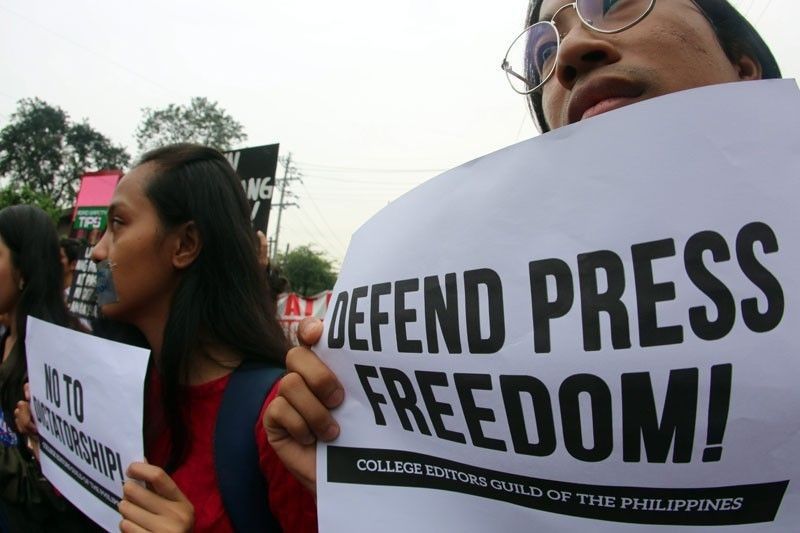
MANILA, Philippines — Press freedom advocates and rights defenders on Tuesday raised the lack of meaningful improvements to the state of free expression under President Ferdinand Marcos Jr. ahead of a United Nations independent expert’s 10-day visit to the Philippines.
Emphasizing that “all is not well” with the human rights situation in the Philippines, various groups have called on Irene Khan, the United Nations special rapporteur on freedom of opinion and expression, to probe the state-sponsored attacks that continue to back media workers, indigenous people’s groups and other minorities into a corner.
Khan will be visiting the country from January 23 to February 2 to take stock of the Philippines’ state of free speech and press freedom. She is set to be the fifth UN envoy to tour the country to gather information about its human rights situation.
“Khan’s visit is important because we need to tell the world that all is not well in the Philippines,” Karapatan Secretary-General Cristina Palabay said at a press conference.
“During the president’s jet-setting trips, he often says: ‘I’m better than my father. I’m better than all of the monsters combined.’ But things have not changed at all,” Palabay said, adding that rights groups would attest to seeing worsening attacks on free speech “on the ground.”
Palabay said that the worsening state of free speech under the Marcos administration has been due to the continued use of “vicious” policies to violate people’s human rights, including their freedom of expression and opinion.
Palabay also noted that the recently launched Fight to Express Network has submitted 40 “inputs” or reports to Khan that detail the human rights violations experienced by different sectors, including farmers, fisher groups, teachers, health workers, members of the clergy and other victims of rights abuses.
“This is no small feat,” Palabay said. “So yes, we are ready.”
Threats to media remain
Media group National Union of Journalists of the Philippines (NUJP) has documented at least 109 incidents of attacks and threats against media workers during the Marcos presidency — 47% higher compared to the same period under Marcos’ predecessor, former President Rodrigo Duterte.
“Despite slight improvement since the end of the presidency of Rodrigo Duterte, there have been few policy changes to ensure that media workers in the Philippines are able to report safely and with no fear of retribution for simply doing their jobs,” the NUJP said in a statement on Tuesday.
While Marcos does not openly encourage violence against media workers, unlike Duterte, concerns remain over whether the current administration has done enough to safeguard journalists from retribution and harassment.
“I don’t think we can deny that there is still a tendency to self-censor, and where the fear was centered on Duterte before, it is more diffused now,” NUJP chairperson Jonathan de Santos told Philstar.com.
“Where there was just one center of power, there are now several powerful figures that journalists might be wary to ‘offend,’” Santos said, adding that the president’s absence of threats against the press is “an improvement, but also the bare minimum.”
Human rights watchdog Freedom House gave the Philippines a low one-point score in terms of having a free and independent media in its 2023 report. Freedom House noted that the Philippines “remains one of the most dangerous places in the world for journalists” and that journalists continue to be harassed and threatened in the course of their work.
Nearly a quarter of the incidents documented by NUJP in 2023 were also related to the red-tagging of media workers.
“Even as the government says there is no policy to label activists, rights defenders and journalists as “rebels” and “terrorists”, the practice has continued,” the NUJP said.
IP groups’ rights under attack
A group advocating for the rights of indigenous people, the Katribu Kalipunan ng Katutubong Mamamayan ng Pilipinas, has also flagged the continued red- and terror-tagging of indigenous peoples defending their ancestral lands.
In a statement on Tuesday, the group called on Khan to investigate the Philippine government’s use of counter-terrorism policies like the Anti-Terrorism Act of 2020 and Executive Order 70 to target indigenous people.
“Regarding the people’s rights to freedom of expression, Indigenous Peoples in the country indomitably assert their rights to land and self-determination. However, the government forcibly denies, neglects, and tramples these rights through the use of violence and state policies,” the group said. — Cristina Chi
*****
Credit belongs to: www.philstar.com
 Atin Ito First Filipino Community Newspaper in Ontario
Atin Ito First Filipino Community Newspaper in Ontario






